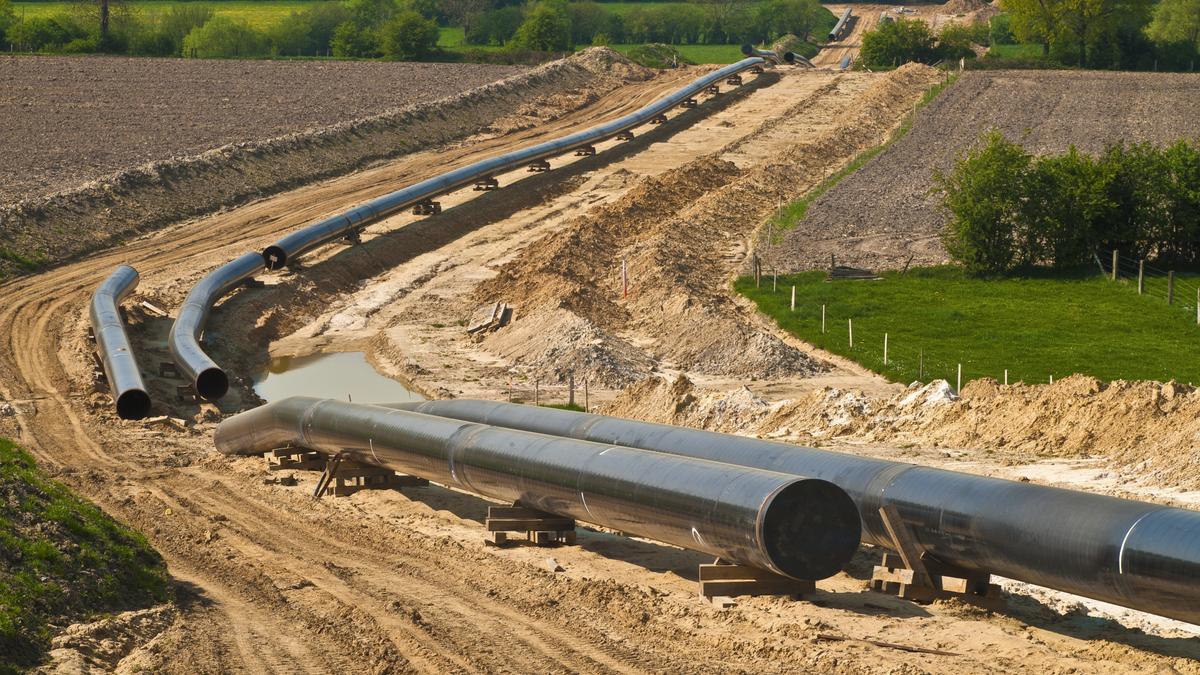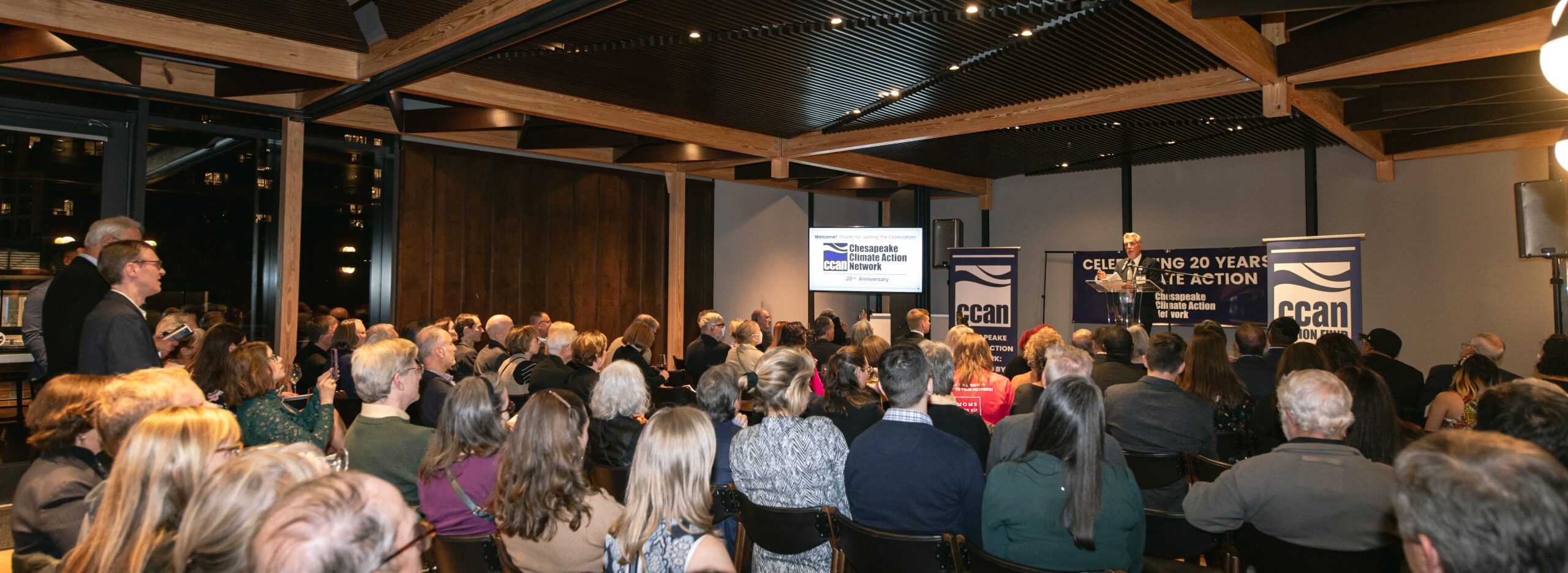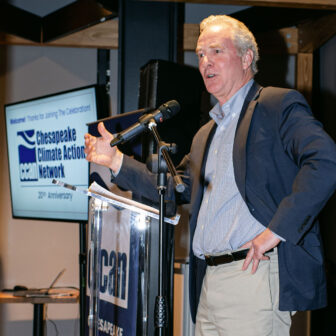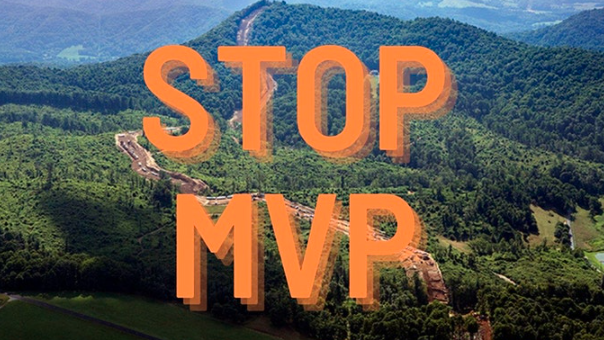The Mountain Valley Pipeline (MVP) is 0-4 on first down conversions. The red zone is nowhere in sight, and the clock is running out. Why are people still betting on this team?
Continue readingRichmond Times-Dispatch Letter to the Editor: Virginia is ready for electric vehicle standards
The 2023 General Assembly session is around the corner, and the partisan fearmongering has unfortunately already begun. Republicans pre-filed seven bills to repeal clean car standards.
Continue readingCelebrating 20 Years Of Climate Action, Passage of Historic Climate Bill, and a Promise to Keep Fighting for Our Planet
Governor Youngkin’s “All-of-the-Above” Energy Plan Fails Virginia in the Midst of Climate Crisis and the Push for New Renewable Energy Nationwide
RICHMOND, VA-Virginia Governor Glenn Youngkin’s “2022 Virginia Energy Plan” – released today – is a veiled threat to Virginia’s clean-energy progress in recent years and threatens to move the Commonwealth backwards during the world’s last-chance decade to solve climate change. The 29-page report takes a supposedly “all-of-the-above” approach to energy, calling for support for more coal and gas and nuclear while calling for changes to the state’s landmark “Clean Economy Act of 2020” and “Clean Cars Act of 2021.”
Mike Tidwell, Director of the Chesapeake Climate Action Network, issued the following statement in response to the new energy plan from the Virginia Department of Energy:
“As hurricanes bash the U.S. in the east and wildfires torch the west, Governor Youngkin’s new energy plan for Virginia fails to meet the challenge of cleaning our air and solving the climate crisis. His ‘all-of-the-above’ approach would have been fine in 1950 but has no place in the year 2022. Methane gas is not ‘clean’ and nuclear power is fantastically expensive and will not protect consumers or the environment. Instead of embracing false solutions like gas and nuclear, the Governor should be embracing and implementing the Virginia Clean Economy Act and the Regional Greenhouse Gas Initiative – policies already on the books and benefiting Virginians. Instead, he calls for review and changes to these fully functioning and successful policies. The people of Virginia want serious solutions, not games, when it comes to energy. They want low-cost wind and solar and the electric vehicles Detroit is all-in on manufacturing. Glenn Youngkin should catch up to modern Virginia and leave 1900s Virginia behind.”
The 2022 Virginia Energy Plan can be read here.
Contact:
Mike Tidwell, Executive Director, CCAN, mtidwell@chesapeakeclimate.org, 240-460-5838
KC Chartrand, Communications Director, CCAN, kc@chesapeakeclimate.org, 240-620-7144
# # #
Related campaign:
Youngkin is Marching Virginia Backwards
We Need to Fight against Manchin’s Dirty Deal
Partner Job Highlight: Get Paid to Learn Organic Farming
A 60-acre vegetable, fruit and Christmas tree farm, one of PA’s oldest sustainable farm since 1972, tucked away in the foothills of the Appalachian Mountains in Needmore, PA, with the (swimmable) Licking Creek running through the farm and wonderful hiking
SEEKING FARM STAFF for the 2022 season
Visit their website for full information on the farm: www.lickingcreekbendfarm.com
AVAILABLE: NOW through Thanksgiving – MINIMUM 3-MONTH’S COMMITMENT
SALARY: $1,000/month plus room and board (with increases based on performance and time commitment). Free WiFi
APPLY: Now! Email us with a cover letter, resume and references
We have 2 staff openings. Our farm is worker-run. Applicants are interviewed and hired by the staff. Our permanent staff has worked on the farm for more than 10 years.
MUST BE FULLY VACCINATED and HAVE A VALID DRIVERS LICENSE and be a US citizen.
EXPECT TO LEARN: all the basics of starting and running a farm including: starting seeds, greenhouse production, planting, fertilization, drip irrigation, high tunnel growing AND cultivation bee-keeping. Our staff run several farm markets and we offer a 100 family CSA. Each staff person takes turns working at our farm markets and preparing the CSA shares. Philosophically, the farm supports a policy of growing food sustainably and pricing it affordably in mixed income DC area neighborhoods.
CONTACT: Info@lickingcreekbendfarm.com
In Yet Another Significant Blow to MVP, Army Corps of Engineers Signals Stream Crossing Permit Will Be Indefinitely Delayed Following Latest Court Decision
Friday, February 11, 2022
Contact:
Contact: Morgan Caplan, (443) 986-1221 or Morgan.Caplan@sierraclub.org
Washington, DC — This week, the U.S. Army Corps of Engineers committed to withhold a Clean Water Act Section 404 permit for the Mountain Valley Pipeline (MVP) at least until the project has a valid Endangered Species Act biological opinion. This confirmation was received in response to a letter from Appalachian Mountain Advocates and the Southern Environmental Law Center. The 404 permit, if issued, would allow for the pipeline to trench and blast through hundreds of streams and wetlands in its path.
This is another serious blow to the beleaguered project, which has already had several key permits rejected by the courts. In early February, the 4th U.S. Circuit Court of Appeals invalidated the biological opinion and incidental take statement issued by the U.S. Fish and Wildlife Service under the Endangered Species Act for the Mountain Valley Pipeline. That decision came on the heels of the court’s late-January invalidation of U.S. Forest Service and Bureau of Land Management approvals for the second time, preventing the pipeline from crossing the Jefferson National Forest.
The Corps’ response casts further doubt on the future of the Mountain Valley Pipeline and means that for the foreseeable future the pipeline will not be able to build across streams, wetlands and several major rivers. Those crossings threaten long-term degradation of water quality.
“That the Corps did its job, simply by following the law — gives hope. Southwest Virginia, together with our neighbors to the west and the south, have endured eight years of MVP abuses, specifically to our exceptional waters that are the life force of our forests, aquifers, karst, wetlands and floodplains. By following the law, the Corps has answered the moral imperative of the climate emergency — that in supporting our most fragile biological species and the waters they depend upon, we protect our people — and their future on Earth — over profit,” says Roberta Bondurant, a member of Preserve Bent Mountain, a chapter of Blue Ridge Environmental Defense League (BREDL), and Co-Chair of Protect Our Water, Heritage, Rights Coalition (POWHR).
“The recent letter from the Corps means MVP can’t be granted an ‘all access pass’ to our waterways before the pipeline’s effects on endangered fish are carefully studied,” Sierra Club Senior Organizer Caroline Hansley said. “This project has already received major setbacks with permits still missing and more being challenged, along with millions of dollars in fines for hundreds of violations of clean water protections. Not only is MVP billions over budget and more than three years behind schedule, MVP still has hundreds of difficult waterbody crossings left to complete. Investors and lenders should walk away from this unjust and unneeded project. We all have a right to clean water and will continue to make sure our communities are protected.”
“The Corps’ decision to delay action on the 404 permit is the right course at this time,” said Peter Anderson, Virginia Policy Director for Appalachian Voices. “We will continue to hold the unnecessary Mountain Valley Pipeline accountable for all of its serious flaws and the harms it inflicts on our communities.”
David Sligh, Conservation Director at Wild Virginia stated: “One resource agency after another has failed the public in granting ill-considered and improper approvals for the Mountain Valley Pipeline. In this case, the Corps has acknowledged its legal duty and that gives many of our precious and sensitive streams a reprieve from MVP’s damages. Now is the time for federal officials to finally stop this project, which has already caused so much pain and pollution in the affected communities.”
“Climate change poses a ‘code red for humanity,’ according to the world’s leading scientists. The last thing we need is another massive pipeline that will prolong our reliance on dirty fracked-gas, harm Virginia’s streams and rivers, and trample on people’s property rights,” said Anne Havemann, general counsel with the Chesapeake Climate Action Network. “As permit after permit gets thrown out or delayed, it’s time for MVP to see the writing on the wall and abandon the project.”
“This is very good news about a project and a route that never should have been allowed,” commented Bill Wolf of Preserve Craig, Inc.
“Endangered species like the candy darter and Roanoke logperch are nature’s ‘canaries in the mines’ — a warning to us all about the health of our water, air and entire ecosystem. We appreciate that the Army Corps of Engineers is paying attention and will not complete its review until a valid Biological Opinion is in place,” commented Howdy Henritz, president of Indian Creek Watershed Association.
###
About the Sierra Club
The Sierra Club is America’s largest and most influential grassroots environmental organization, with millions of members and supporters. In addition to protecting every person’s right to get outdoors and access the healing power of nature, the Sierra Club works to promote clean energy, safeguard the health of our communities, protect wildlife, and preserve our remaining wild places through grassroots activism, public education, lobbying, and legal action. For more information, visit www.sierraclub.org.
About the Protect Our Water, Heritage, Rights Coalition
Protect Our Water, Heritage, Rights (POWHR) is an interstate coalition leading the fight to stop the Mountain Valley Pipeline. The coalition includes individuals and groups from counties in Virginia and West Virginia dedicated to protecting water, land, and communities from fossil fuel expansion and environmental injustice. For more information, visit our website: powhr.org.
Federal Court Invalidates Another Key Permit in Endangered Species Act Case, Casting Serious Doubt on the Future of Mountain Valley Pipeline
Decision comes just after Fourth Circuit invalidated U.S. Forest Service and Bureau of Land Management
Thursday, February 3, 2022
Contact:
Morgan Caplan, (443) 986-1221 or Morgan.Caplan@sierraclub.org
Molly Moore, (847) 401-3633, molly@appvoices.org
Washington, DC — Today, the U.S. Court of Appeals for the Fourth Circuit invalidated the biological opinion and incidental take statement issued by the U.S. Fish and Wildlife Service under the Endangered Species Act for the Mountain Valley Pipeline. The court found that the agency failed to adequately analyze the project’s environmental context when assessing the detrimental impacts to the Roanoke logperch and the candy darter, a species on the brink of extinction. The court’s decision means that construction should not move forward along the 304-mile pipeline route.
Today’s announcement is a result of a case argued by the Sierra Club on behalf of a coalition of conservation organizations, including Wild Virginia, Appalachian Voices, Chesapeake Climate Action Network, Defenders of Wildlife, West Virginia Rivers Coalition, Preserve Giles County, Preserve Bent Mountain, West Virginia Highlands Conservancy, Indian Creek Watershed Association and Center for Biological Diversity. Appalachian Mountain Advocates also represented the petitioners.
The decision is yet another setback for the Mountain Valley Pipeline after another recent decision from the Fourth Circuit invalidating approvals by the U.S. Forest Service and Bureau of Land Management for construction through Jefferson National Forest. The project continues to face several legal battles and is more than three years behind schedule, barely half complete to full restoration, and billions over budget. The pipeline has been required to pay millions of dollars in fines for more than 350 water quality-related violations in Virginia and West Virginia, and has disturbed and destroyed important habitat that has adversely affected local wildlife. Today’s decision should stop the pipeline’s onslaught against one of the largest remaining wild landscapes in the eastern U.S.
Sierra Club Senior Director of Energy Campaigns, Kelly Sheehan, said, “Three more key federal agencies have been sent back to the drawing board after failing to analyze MVP’s harmful impacts. The previous administration’s rushed, shoddy permitting put the entire project in question. Now, the Biden administration must fulfill the commitments it has made on climate and environmental justice by taking a meaningful, thorough review of this project and its permitting. When they do, they will see the science is clear: MVP is not compatible with a healthy planet and livable communities. MVP must not move forward.”
Russell Chisholm, Co-Chair of the Protect Our Water, Heritage, Rights (POWHR) Coalition, said: “Sacred life prevailed today with the court’s acknowledgement of the harmful impact MVP has on everything in its path, specifically endangered and threatened species. Holding MVP accountable to the law is key to the ultimate cancellation of this noxious fracked gas pipeline. This decision not only protects the candy darter and other endangered species, it sets us on course to stop MVP, decisively transition away from deadly fossil fuels, and reroute towards a renewable economy on a livable planet.”
Sierra Club Senior Attorney Elly Benson released the following statement: “MVP’s dangerous pipeline project has already destroyed and degraded the habitat of endangered species along its route, in addition to the threat it poses to clean air, water, and our communities. We have seen its harmful effects on the region’s forests and streams as MVP has put profits before people and wildlife. Today’s decision underscores that the Fish and Wildlife Service can’t minimize MVP’s impacts on vulnerable species like the Roanoke logperch and candy darter that are already facing numerous other serious threats, including climate change.”
“At a time when we need to urgently move away from fracked-gas pipelines and all the harms they bring — from impacts to endangered species to damage to water quality to climate change — the law and science prevailed in this case,” said Anne Havemann, general counsel of the Chesapeake Climate Action Network.
Roberta Bondurant of Preserve Bent Mountain, a local member group of the POWHR Coalition, said, “Today’s is a sweetly welcome decision in our fight to stop the ravage of MVP. The Bent Mountain community together with our allies, have fought relentlessly, and at unspeakable costs, to protect forest, meadow and waters of our venerable Appalachians. This is a banner day for Planet Earth—-the Swomee Swan soars, the Humming Fish jumps, and the Truffula Tree breathes a grateful sigh of relief.”
“Once again, the courts have found that federal regulators weren’t following the laws passed by Congress to protect the public and our environment,” said Peter Anderson, Virginia Policy Director for Appalachian Voices. “Communities in this region rely on its rich biodiversity to support many recreational and economic opportunities. We take seriously our laws protecting habitat and ecological function, even if Mountain Valley Pipeline does not.”
“Again, the agencies that should be guardians of our most precious resources and the public interest failed us,” stated David Sligh, Conservation Director at Wild Virginia. “But today is a victory for sensitive and valuable species, which have already been harmed by MVP’s pollution. This decision again reinforces the truth that this destructive project must not be allowed to continue. The company needs to face that fact now and should be forced to help heal the wounds it has inflicted.”
“This is an incredible victory,” said Jared Margolis, Senior Attorney at the Center for Biological Diversity. “The Mountain Valley Pipeline is a fossil fuel nightmare that threatens the essential habitat of imperiled wildlife. These projects lock us into an unsustainable spiral of climate change that inflict incredible damage to vulnerable species. That cycle must end.”
“Enough is enough,” said Cindy Rank of WV Highlands Conservancy. “This is just one more example of how wrong this pipeline is, how much it harms the earth and the critters that make our world a treasure to be protected from unwise developments like MVP.”
###
About the Sierra Club
The Sierra Club is America’s largest and most influential grassroots environmental organization, with millions of members and supporters. In addition to protecting every person’s right to get outdoors and access the healing power of nature, the Sierra Club works to promote clean energy, safeguard the health of our communities, protect wildlife, and preserve our remaining wild places through grassroots activism, public education, lobbying, and legal action. For more information, visit www.sierraclub.org.
About the Protect Our Water, Heritage, Rights Coalition
Protect Our Water, Heritage, Rights (POWHR) is an interstate coalition leading the fight to stop the Mountain Valley Pipeline. The coalition includes individuals and groups from counties in Virginia and West Virginia dedicated to protecting water, land, and communities from fossil fuel expansion and environmental injustice. For more information, visit our website: powhr.org.
CCAN Winter News
CCAN Responds to Virginia Water Control Board Approval of MVP Permit: “This is a Major Step in the Wrong Direction”
The Chesapeake Climate Action Network (CCAN) joined other climate activists today in reacting to the Virginia State Water Control Board’s decision to approve a water permit for the Mountain Valley Pipeline. Below is the statement from CCAN:
“The decision to permit a pipeline that has already amassed over 300 violations of existing permits is not only reckless, but works against the interests of residents of the Commonwealth and threatens the existence of all living things,” said Elle De La Cancela, Central Virginia Grassroots Organizer for Chesapeake Climate Action Network. “We need to act on climate now, and this is a major step in the wrong direction. The MVP will undoubtedly continue to destroy areas of private and public land, only to line the pockets of CEOs and investors. We will continue to fight, as we await decisions from our neighbors in West Virginia, the Army Corps of Engineers, and the 4th Circuit Court of Appeals.”
See below for the complete press release from activists opposing the MVP Pipeline. ______________________________________________________________
FOR IMMEDIATE RELEASE: December 14, 2021
Contact:
Denali Nalamalapu, (302) 307-6966, denali@powhr.org
Dan Radmacher, (540) 798-6683, dan@appvoices.org
Virginia Water Board Approves Key Permit for Mountain Valley Pipeline
RICHMOND, VA — Today, the Virginia State Water Control Board approved a water permit for the Mountain Valley Pipeline (MVP) via a 3-2 vote, finalizing state approval for the MVP to build across hundreds of Virginia waterways.
The Board is an independent regulatory body composed of seven private citizens appointed by the Governor. Despite significant evidence to the contrary, the Board accepted the Virginia Department of Environmental Quality’s recommendation and found that the agency’s draft permit will adequately protect more than 200 water bodies in the state from the pipeline’s impacts. Under the Clean Water Act, projects like pipelines that release pollutants into U.S. waters must secure both federal and state permits that assure water quality standards will not be violated. The MVP has already violated Virginia’s water protection laws more than 300 times and has been heavily fined for failing to control erosion and sediment.
Despite this decision, the fight to stop the Mountain Valley Pipeline continues. The project still needs authorizations from the West Virginia Department of Environmental Protection and the U.S. Army Corps of Engineers in order to cross water bodies. Additionally, the Federal Energy Regulatory Commission has yet to rule on MVP’s request to bore under waterways in West Virginia and Virginia.
Roberta Bondurant, Co-Chair of the Protect Our Water, Heritage, Rights Coalition (POWHR) responded: “As we reflect on the losses of neighbor landowners and communities suffering MVP’s destructive effects on land, forests and waters, in the midst of an intensifying climate crisis, Virginia’s Water Board has marked for itself an infamous place in history. In granting MVP, a 300 plus repeat offender, a Clean Water Act 401 permit, Virginia regulators have shown its willful indifference to the stark reality of climate catastrophe and squandered an opportunity to do real environmental justice for the people of Southwest Virginia.
“MVP’s chosen route for its mega-pipeline, blasting and barreling across steep, landslide and earthquake prone mountain slopes, our pristine streams, and protective wetlands, multiplies already high risks of drinking water pollution and fiery explosions, imposing constant threats upon vulnerable and often silent witnesses in its path — including the elderly, single, low- and fixed-income residents, people of color, military veterans, and the disabled. MVP at once renders whole communities either ‘pipeline prisoners,’ or if they are fortunate enough to be able to leave, ‘environmental refugees.’ The result today, shameful but not surprising, leads us to brace for MVP’s continued wrath upon our people and their great places. We will go forward– relentless in pursuit of environmental justice — for the livable future that is the birthright of today’s and future generations.”
Peter Anderson, Virginia Policy Director for Appalachian Voices said: “While we are very disappointed with Virginia regulators’ decision today, the Mountain Valley Pipeline still has a long and uncertain road ahead. We remain convinced that this pipeline cannot be built in compliance with the law, and we will continue to stand with impacted communities as they fight this unnecessary and dangerous project.”
Lynn Godfrey, Sierra Club Virginia Chapter Community Outreach Coordinator, said, “The Mountain Valley Pipeline mainline is billions of dollars over budget, three years behind schedule, and has racked up more than $2 million in fines for water quality-related violations in Virginia and West Virginia. The MVP project already threatens 236 of Virginia’s waterways and this latest permit would signify the continued disregard of water sources essential to maintain a healthy ecosystem with lasting and permanent impact to Southwest Virginia’s waterways. We will not stand by as regulators continue to give a free pass to corporate polluters and will pursue all legal avenues to ensure that this pipeline is never completed.”
Elle De La Cancela, Central Virginia Grassroots Organizer for Chesapeake Climate Action Network: “The decision to permit a pipeline that has already amassed over 300 violations of existing permits is not only reckless, but works against the interests of residents of the Commonwealth and threatens the existence of all living things. We need to act on climate now, and this is a major step in the wrong direction. The MVP will undoubtedly continue to destroy areas of private and public land, only to line the pockets of CEOs and investors. We will continue to fight, as we await decisions from our neighbors in West Virginia, the Army Corps of Engineers, and the 4th Circuit Court of Appeals.”
# # #





















